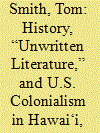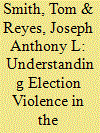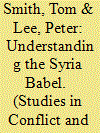|
|
|
Sort Order |
|
|
|
Items / Page
|
|
|
|
|
|
|
| Srl | Item |
| 1 |
ID:
156914


|
|
|
|
|
| Summary/Abstract |
This article investigates Twitter data related to the kidnapping case of two German nationals in the southern region of the Philippines by the Abu Sayyaf Group (ASG). It explores perceptions of the ASG, along with associated organizations and sentiments indicated in the tweets together with statistically significant relationships. Findings revealed that: “Rebel” and “Militant” were the most frequently used labels for the ASG; a majority of the tweets contained sentiments that assess threats such as abduction and kidnapping of hostages; and almost half contained words that indicate negotiation or concession to the demands of the captors. Logistic regression analyses on “Rebel” and “Islamist” revealed positive coefficients for these sentiments used as predictors. This meant that people who assessed threats and expressed sentiments that responders should concede to the captors’ demands were more likely to use the “Rebel” or “Islamist” labels. Rather than the two longstanding dominant narratives of the ASG as terrorists and criminals, the emerging rebel and militant labels suggest a more domestically and politically sensitive Twitter commentary than is represented in the work of the Al-Qaeda-centric paradigm exponents. These findings, along with the complex associated political and policy contexts and implications, are discussed in this article.
|
|
|
|
|
|
|
|
|
|
|
|
|
|
|
|
| 2 |
ID:
169501


|
|
|
|
|
| Summary/Abstract |
When the Hawaiian Islands were annexed by the United States in July 1898, it marked the culmination of a chain of events orchestrated by white, mostly American, lawyers and businessmen. In 1887, this group had imposed upon the Hawaiian king, Kalākaua, a constitution effectively stripping the monarchy of its executive powers. Six years later, however, they still found themselves frustrated by the ability of Kalākaua’s successor, Queen Lili‘uokalani, to manipulate the political process. Therefore, in January 1893, they colluded with the U.S. minister to Hawai‘i and troops in Honolulu harbor to elicit the queen’s abdication, and with it the end of the monarchy. The desired annexation to the United States was not immediately forthcoming, so the provisional government declared a republic in July 1894, which endured until U.S. president William McKinley finally intervened to take the islands in 1898.
|
|
|
|
|
|
|
|
|
|
|
|
|
|
|
|
| 3 |
ID:
179934


|
|
|
|
|
| Summary/Abstract |
Despite election violence being a commonly agreed upon phenomena in the Philippines, there had been a dearth in academic research in recent years, largely due to the lack of reliable sources of information. To address this, this article adapts recognised methods from studies such as Newman’s 2013 paper, together with McGrath and Gill’s 2014 research on terrorism and elections. To expose the timing of election violence, incidents were tracked relative to election dates for the period from 2004–2017, with the results indicating violence increases closer to an election date, and frequency substantially increased during the 14-year period. This is the first academic journal article since Linantud in 1998 to focus on the issue of election violence in the Philippines but through adaptive methodologies goes further to make national analysis. Furthermore, findings reveal statistically significant differences on the types of terrorist attacks and types of targets when comparing election and non-election periods. Complicating factors are explored in relation to majority of attacks attributed to ‘unknown’ actors and the complex situation during elections. The results also demonstrate that election violence in the Philippines is dominated by the New People’s Army and the use of assassination. The paper makes the case for further research and the creation of a dedicated database of election violence in the Philippines and elsewhere, and finally evaluating these few measures implemented by the government that have failed to stem election violence.
|
|
|
|
|
|
|
|
|
|
|
|
|
|
|
|
| 4 |
ID:
175590


|
|
|
|
|
| Summary/Abstract |
The war in Syria, and its ongoing analysis, is burdened by a variety of seemingly irreconcilable political motivations, actions, ideologies, religious affiliations, and power dynamics of multiple state and nonstate actors. In this context, various moral perspectives appear to come into direct conflict, underpinning the actions of the actors involved and to varying degrees influencing their competing political interests. Is there a coherent dialogue of moralities between the rivals involved or is Babel reborn with moral claims being launched but with no real exchange of meaning involved? On Syria, the answer is a complicated mixture of both but within which are important and as yet underappreciated patterns of convergence and divergence. This article looks at the leading states involved as well as the role of individuals to elucidate this pattern of overlap and difference in the morality discourses surrounding Syria. Ultimately, it is argued that a moral Babel is not reborn in Syria: there is sufficiently common moral language being used by all sides for a degree of shared meaning to emerge. The challenge is for the protagonists to listen and really hear what is being said and work with those commonalties as tools toward peace.
|
|
|
|
|
|
|
|
|
|
|
|
|
|
|
|
|
|
|
|
|